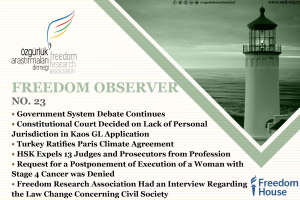Controversy over the Declaration of Retired Admirals
On April 3, 104 retired admirals from the Navy issued a declaration emphasizing importance of the Montreux Straits Convention and secularism. The declaration was published after the speech of the Speaker of the Turkish Grand National Assembly, Mustafa Şentop, where he claimed that "the President could technically dissolve Montreux". The declaration was also understood as a critical response to the publishing of footage of an admiral wearing a turban. In the declaration, it was stated that "the opening of the Montreux Convention up to debate within the scope of the authority to cancel the Canal Istanbul and international agreements is met with concern”.[1] The officials from both the AKP and MHP circles targeted signatory admirals, claiming that this declaration is yet another example of the military’s tendency for a coup d’état. The President Erdogan lashed out at the retired admirals and described the so-called declaration as “malicious, incompatible with freedom of expression that seriously implicates a coup”. MHP proposed the cancellation of housing and protection rights to punish the retired admirals and these rights were revoked following the investigation initiated by the Ankara Chief Public Prosecutor's Office.[2] As part of the investigation, Turkish authorities detained 10 former admirals and their homes were searched.[3]
Opposition parties, on the other hand, also criticized this declaration by the way it was published as it highly resembles to a call for a coup. However, the opposition parties stressed that this declaration would only serve to change the agenda that the government highly needed amidst many economic and political controversies surrounding the country. On CHP and IYI Party fronts, both Kılıçdaroğlu and Akşener stated that while the main agenda should be the economy, the statement is being kept on the agenda more than it deserves, while Babacan the leader of DEVA Party, said in a statement that the government could use this declaration to turn the Kanal Istanbul debate in its favor.[4] Opposition leaders also criticized the detention of retired admirals and emphasized freedom of expression.
Turkey’s historic military coups and memorandums left traumatic wounds in the collective memory of the public and politicians. It is, therefore, understandable that the declaration issued by retired military officers is causing concern among the government and other political actors. However, it should also be reminded that since the Ergenekon case, Turkey’s recent history witnessed systematic violations of individual rights and freedom of expression under the excuse of preventing a military coup that served revanchist showdowns among opposing parties. The immediate initiation of the custody operations upon the declaration, which contains the views of the retired navy officials on the current debates and was not a call for a coup, can be evaluated in this manner.
Constitutional Court Returns the Closure Case Indictment against HDP
The General Assembly of the Constitutional Court made the first examination of the closure case against the People's Democracy Party (HDP) on March 31, 2021, and identified procedural deficiencies and unanimously decided to send back the indictment to the General Prosecution Office of the Supreme Court of Appeal.
Although the Constitutional Court has yet to explain the reasoned decision, Anadolu Agency (AA) stated that the indictment “did not sufficiently cover the actions of party members regarding claims that they became the focal point of acts against the indivisible unity of the state with its nation and people” regulated by the articles no. 68 and 69 of the constitution.[5]
If the reason behind the decision to return the indictment is as AA stated, it is clear that this decision clearly goes beyond a simple completion of above-mentioned procedural deficiencies. In this respect, the Constitutional Court seems to have returned the indictment on substantial grounds mainly because the request of the closure of HDP was not justified. Indeed, the request can be submitted again by making the necessary revision and justification by the Office of the Supreme Court of Appeals and the case can be reviewed by the Constitutional Court. However, the decision to send back to indictment indicates that the indictment was written in rather a hasty fashion and seems to have prepared on politically-motivated grounds.
After the decision of the Constitutional Court to send back the indictment, Devlet Bahçeli, the leader of the MHP, said that the Constitutional Court should be closed. Claiming that “the Constitutional Court’s decision is null and void in the national conscience", Bahçeli takes his word a step further and noted that “the closure of the HDP as well as the dissolution of the Constitutional Court, now, appears as an urgent target”.[6] The fact that the Constitutional Court faces such harsh reactions by members of the government in every decision that the government does not like is a serious threat to the independence of the court.
Taken together with the criticisms that the Constitutional Court has been under the influence of the government to a great extent with the changes in the member profile and the many controversial decisions of the Court, this harsh reaction to the Court shows that the government cannot tolerate any decision against its own agenda.
It is understood that the renewed call for a new constitution, which was voiced concurrently with the demand for the closure of the Constitutional Court, indicates the government’s longing desire to establish an absolute power.
Prison Sentence for Editor-In-Chief on Watch Eren Keskin in the Case of ‘Ozgur Gundem’
Lawyer Eren Keskin, the co-chair of the Human Rights Association and human rights defender, who was also the editor-in-chief on a watch that he was carrying out in solidarity with Özgür Gündem newspaper, shut down by an emergency decree, was sentenced to 6 years and 3 months in prison for membership of a terrorist organization.[7] Along with Eren Keskin, the owner of the newspaper, Kemal Sancılı, and responsible editor-in-chief İnan Kızılkaya was sentenced to 6 years and 3 months in prison at the decision hearing of the Özgür Gündem main case held on February 15, 2021 at the Istanbul 23rd Heavy Penal Court. Editor-in-Chief Zana Kaya was also sentenced to 2 years and 1 month in prison.
In the reasoned decision of the court, it was stated that “Eren Keskin's own articles and the articles that are regarded as propaganda for a terrorist organization according to the Press Law No. 5187 are plenty. Moreover, the defendant is included in the hierarchical structure of the terrorist organization judging by the actions of the defendant, the purpose he pursued, and the intensity of his intent as a whole. Therefore it is understood that the defendant adopts the purpose of the organization and thereby leaving his will to the will of the organization to be ready to fulfill the duties to be assigned that establishes an organic bond between the defendant and the organization, thus the crime of being a member of an armed terrorist organization has occurred.” As clear as it is that the only evidence that the court cites as evidence of being a member of a terrorist organization is that Keskin wrote many articles in the newspaper and that some of the articles published in the newspaper when he was the editor-in-chief, which he carried out voluntarily, were described as propaganda for a terrorist organization. Such a wide interpretation of the legislation on terrorism as made by Turkish authorities is a serious threat to the principle of the legality of crimes and punishments as well as freedom of expression.
In the petition of appeal dated 30.03.2021, the Public Prosecutor requested that Eren Keskin to be punished also for making propaganda for a terrorist organization, inciting to commit a crime, praising the crime and the criminal.
Chaos of Unemployment and Number Games
President Erdoğan stated on February 19th that the implementation of the “short-term employment allowance” will end on March 31st, 2021. [8] In addition, the dismissal ban was also extended by two months based on March 17, 2021. [9] At this point, the issue starts to get complicated. According to data released by the Turkish Employment Agency (İŞKUR), approximately 1.3 million people benefited from short-term employment allowance in February 2021.[10] This number was 3.2 million in April 2020. A method unknown to most people is used to calculate the number of unemployed people. According to the employment calculation of Turkish Statistical Institute (TURKSTAT); “However regular employees with a job who did not work during the reference period for various reasons are considered as employed only if they have an assurance of a return to work within a period of 3 months or if they receive at least 50% of their wage or salary from their employer during their absence.” [11]
In other words, those who receive short-term employment allowance were not considered unemployed. At this point, a regulation was also made in order not to increase unemployment during the unpaid leave phase. According to the President's Decree published on January 13, 2021, the amount of daily cash wage support to be applied to those on unpaid leave was increased by the minimum wage increase rate (21.56%) for 2021 to 47.70 TL per day. [12] This support can be paid for a maximum of 30 days. Workers who are not laid off but sent on unpaid leave will receive 1431 TL per month with a simple account. This is approximately 15 TL more than 50% of the minimum wage. In other words, even if the minimum wage workers are sent on unpaid leave, they will be seen as employed in the shared statistics. This situation is an overlooked example that shows why trust in data is decreasing in Turkey. Hiding the facts is not just about directly manipulating the data. On the contrary, such simple games have been played in front of everyone for a long time in Turkey. However, the dismissal ban, short-term employment allowance, and cash wage support have been turned into a tool to understate the actual amount of unemployed people. All these meaningless regulations that are made to escape the truth, may help to cover some things up, and the government can hope for help from this. But in the long run, those who live in this country bear the cost of these mistakes and number games. The principle of transparency, which is one of the most fundamental principles of a democratic rule of law, receives irreparable wounds.
[1]https://www.aljazeera.com/news/2021/4/4/turkey-condemns-warning-by-retired-admirals-over-bosphorus-treaty
[2] https://www.dailysabah.com/politics/legislation/retired-admirals-declaration-is-a-call-for-coup-mhp-leader-bahceli
[3] https://www.aljazeera.com/news/2021/4/5/turkey-issues-arrest-warrants-over-retired-admirals-open-letter
[4]https://www.hurriyetdailynews.com/govt-reaction-to-retired-admirals-declaration-part-of-fake-agenda-chp-163706
[5]https://www.reuters.com/article/turkey-security-hdp/update-2-turkish-court-sends-indictment-seeking-ban-of-pro-kurdish-party-back-to-prosecutor-idINL8N2LT53V
[6]https://www.duvarenglish.com/mhp-leader-bahceli-demands-closure-of-turkeys-constitutional-court-for-returning-hdp-indictment-to-court-of-cassation-news-56891
[7]https://www.amnesty.org.uk/press-releases/turkey-human-rights-lawyer-eren-keskin-given-six-year-jail-sentence-terrorism
[8] https://www.dailysabah.com/business/economy/turkish-businesses-urge-for-extension-as-short-labor-pay-scheme-ends





